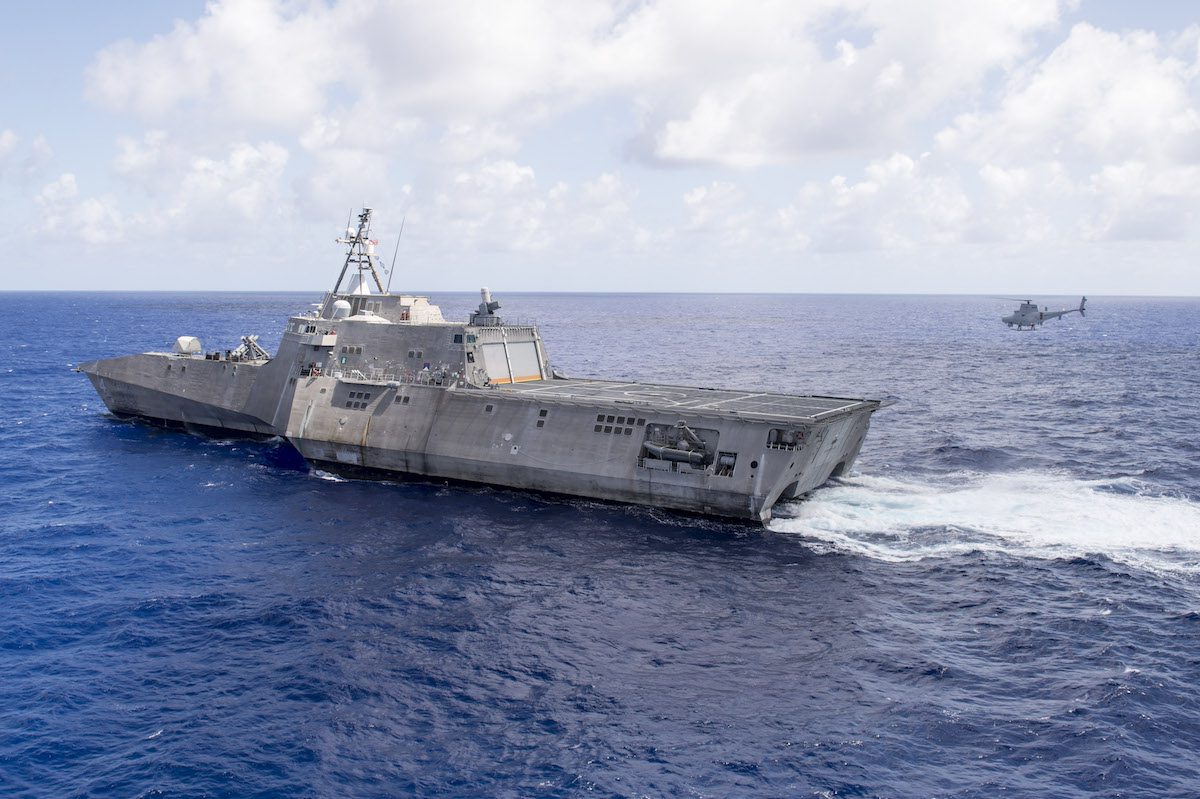Israeli Forces Seize Gaza Aid Boat Carrying Greta Thunberg
Israeli naval forces boarded and seized a charity vessel carrying Swedish activist Greta Thunberg, which had tried to break the naval blockade of the Gaza Strip on Monday.

File photo: A helicopter prepares to land aboard littoral combat ship USS Coronado (LCS 4), October 6, 2016. U.S. Navy Photo
By Tony Capaccio
(Bloomberg) — Congress should consider delaying an upcoming U.S. Navy request for as much as $9 billion to start work on 12 better-armed successor vessels to the troubled Littoral Combat Ship, according to congressional auditors.
A delay beyond fiscal 2018 is warranted because too many unanswered questions remain about the new frigate’s cost and capabilities, the Government Accountability Office said in a report Tuesday. The Navy currently plans to select in mid-2018 between competing designs by Lockheed Martin Corp. or Austal Ltd. The two contractors now make different versions of the LCS.
“The Navy’s impending fiscal year 2018 budget request presents a key opportunity for Congress to affect the way forward for the frigate program by ensuring the Navy possesses sufficient knowledge on cost, design and capability before authorizing” the investment, the watchdog agency said in the report.
Authorizing the money isn’t justified yet because the program has “no current formal cost estimate — independent or otherwise,” will not “have begun key detail design activities” and “has significant unknowns in regards to operational performance.”
Read how the Pentagon blocked an LCS overrun from a GAO report
The Littoral Combat Ship has been controversial, with two defense secretaries under former President Barack Obama questioning whether the light ship intended for shallow coastal waters could survive in combat and then cutting back the numbers planned.
But the Littoral Combat Ship and the successor frigate would be one path toward President Donald Trump’s pledge to rapidly expand the Navy’s fleet to 350 vessels from about 272 today.
“Today, with 28 LCS delivered, under contract, or funded, the Navy plans to wind down the LCS program — with the last contract awards expected in 2017 — and pivot to acquisition of the frigate,” the GAO said.
A decision by Congress to authorize buying the 12 frigates in a block will make it more difficult “to reduce or delay the program should that become warranted,” the agency said.
After awarding the contract for the lead ship in fiscal year 2018, the Navy plans to order one or two ships each year through fiscal year 2025.
Dyke Weatherington, the Pentagon’s acting assistant secretary for defense acquisition, said in written comments included in the GAO report that officials realize there’s risk to the Navy’s approach but that adequate procedural safeguards are in place to review the plan.
The Navy and then the Pentagon will perform independent reviews of the Lockheed and Austal designs for the frigate before release of the final request for proposals this year. Pentagon officials also will assess the readiness of key combat systems and their integration challenges.
The Defense Department’s independent cost analysis group also will scrub the Navy’s proposal “to ensure all program cost and design risks are identified and assessed before making a decision on how the program should proceed in fiscal 2018,” Weatherington wrote.
The GAO said that “while these are positive oversight actions,” the assessments “will lack any frigate-specific” detailed design information.
That lack of information “leads us to maintain that waiting until at least fiscal year 2019 to procure the first ship and to make decisions on future frigate” purchases would provide “decision-makers with a more comprehensive understanding of frigate cost, design, and capability expectations before making substantial commitments,” the GAO said.
Representative Seth Moulton of Massachusetts, the top Democrat on the House Armed Services seapower panel, agreed. “I urge fellow members to heed the GAO’s warning that if not corrected, the fundamental weaknesses in the LCS program will cost the taxpayer billions more than necessary and jeopardize the safety of our sailors in combat,” he said in an email.
© 2017 Bloomberg L.P

Sign up for gCaptain’s newsletter and never miss an update

Subscribe to gCaptain Daily and stay informed with the latest global maritime and offshore news


Stay informed with the latest maritime and offshore news, delivered daily straight to your inbox
Essential news coupled with the finest maritime content sourced from across the globe.
Sign Up